Nigeria has reached a pivotal agreement with Shell to supply gas to its proposed $3.8 billion Brass Island methanol facility. The agreement marks a significant breakthrough in the project’s development. The deal, announced by minister of state for gas, Ekperikpe Ekpo, addresses a major obstacle to the final investment decision on the project and underscores Nigeria’s commitment to tapping into its abundant natural gas reserves.
Despite holding Africa’s largest natural gas reserves of more than 200 trillion cubic feet, Nigeria has faced challenges in fully harnessing this resource. Hence, it faces major capital constraints and infrastructure limitations. Nigeria’s agreement with Shell represents a significant step forward in overcoming these obstacles. Moreover, it paves the way for enhanced utilization of Nigeria’s vast gas reserves.
The Gas Supply and Purchase Agreement (GSPA) with Nigeria will secure a long-term gas supply from a Shell-operated joint venture for the Brass methanol production facility. The facility will be located on Brass Island in Bayelsa state. It will include a gas processing plant, methanol production and refining site, and product export facilities. The successful negotiation of the GSPA demonstrates the commitment of both parties to ensuring an uninterrupted gas supply for the project’s development.
Read: Japanese oil refiners prepare for potential disruptions amid Middle East tensions
Ekpo highlighted the government of Nigeria’s strong support for Shell’s Brass Methanol project. He also emphasized President Bola Ahmed Tinubu’s eagerness to see positive developments before the end of May. This support underscores the project’s strategic importance in driving economic growth and investment in Nigeria’s energy sector.
For more news on energy, click here.




